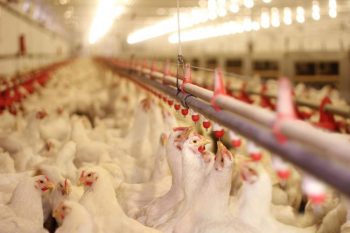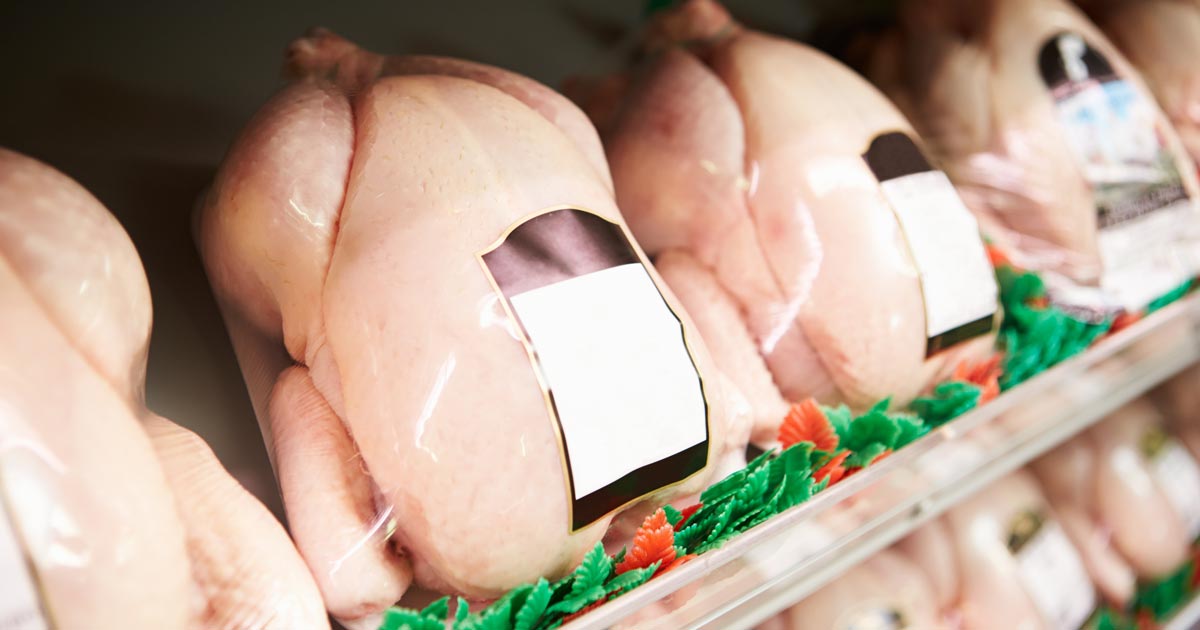I had expected the smell, of course, although it was worse than I imagined. What I hadn’t expected was the speed of it all – the sheer mechanisation of the destruction.
We had already visited the sheep and pig sections of the massive abattoir – myself and a small huddle of veterinary students on a public health rotation traipsing quietly (okay, not so quietly in many instances) through the surreal sights.
I was already a vegetarian by then, and was determined to try to imagine the experience from the animals’ point of view, to try to probe how their welfare was upheld.
As we entered the vast hall where the chickens were killed, I looked across at the coat hanger-like implements on which they were hoisted, before their appointment with the electrified water bath.
I found, as they sped past, I barely had time to count them, let alone consider their perspective as living creatures.
I watched numbly as the birds whizzed along to the bath, and listened while our guide explained that, thanks to a new restraint, the number of chickens that hit the electrified water wing first – and, therefore, received only a painful shock, rather than being rendered insensible when their heads hit it, so remained conscious while both their carotid arteries and jugular veins were slit by a pair rotating blades further down the track – was now “minimal”.
A Humane Slaughter Association discussion of electric water baths explains this more fully.
Moment of reflection
In that moment, I thought about when I had used to eat chicken – the many times I had eaten it distractedly, disinterestedly and not really enjoyed it, or hardly even noticed it, as I tossed it into my mouth.

I thought about the lives of the chickens that had led them to this point – hatching out of their eggs, their brief lives of rapid growth and leg pain and the journey in densely-packed crates to this final high-speed roller coaster.
I’d like to talk, in the next few blogs, about our strange, frequently schizophrenic and often hypocritical attitude to the other animals we share the planet with, and I’d like to start one of my favourite topics – myself, or, more specifically, my vegetarianism.
Although I’ve been a vegetarian for a quarter of a century now, it’s not something I talk about very often.
Although regular readers of my blog may disagree, I’m not a fan of preachiness and I’d rather people made their own decisions for the most part.
Honestly, it’s not something I think about very often, either, nowadays – all the years of avoiding meat have become second nature to me.
I’ve reached the point where I can now cook a bacon sandwich for someone else without wanting to eat it, so I feel I’ve reached a point where a return to carnivorism is unlikely, unless I become one of the walking dead.
Hypocrisy
So, why do I talk about hypocrisy here? Well, you come across a certain attitude when people learn you’re a vegetarian – an attitude that seems selfish and strange to me.
Occasionally, when discussing eating meat and I say I would be quite happy to eat the meat of an animal I’d raised and slaughtered myself (I mean, I’m a total wimp, so the chances of me doing this are zero, but I’m talking about the principle, not the reality), I receive horrified looks.
“But I thought you cared about animals – how could you do that? I couldn’t eat anything that had a name.”
Few things anger me in this world – the inexplicable cancellation of Firefly or the utter unfairness of the early demise of Douglas Adams, for instance – but this passive and falsely sanctimonious attitude infuriates me so much, I generally have to leave the room when it rears its head.
If you’re using this argument, what you’re effectively saying is you would rather fill your stomach with a faceless, nameless creature – one of many – that has suffered from the moment of its birth until the moment of its death, rather than feel the small amount of guilt you may experience from knowing the slice of ham on your plate once belonged to Merlin the happy pig.
No compassion
The attitude displays a total lack of understanding or compassion for the creatures that have suffered in your name, and only selfishness on your part that you’re so divorced from the idea of where your food comes from, you’d rather immensities of misery happened without your knowledge than a few moments of pain that you knew about.
I find myself similarly frustrated with foxhunting debates. I am no fan of foxhunting – I find the idea abhorrent – but I have to admit, ugly and terrifying the end of a fox’s life is in this situation, the suffering experienced is tiny compared with the entire life and death of a chicken intended for slaughter, and yet I note not everyone vocal in their opposition to foxhunting is a vegetarian.
Do they really care about the suffering involved, or is it more an objection to the fact people enjoy the killing?
I don’t like that either, but the fox dies whether someone enjoys it or not. I’m more interested in the suffering involved, and if you profess to be interested in the welfare of animals, I feel that this should be your prime concern, too.
Wow, and there I was saying I didn’t like being preachy. Don’t worry, I’m a hypocrite too – I drink milk and eat cheese, and I suspect me saying “I’d like to be a vegan, but I like cheese too much” is exactly as irritating to a vegan as someone saying “I want to be a vegetarian, but I just love meat” is to me.
I have much more respect for someone who has considered the options and decided he or she is happy eating meat.
Egregious insult
I’ve talked about chickens here, mainly because I feel their lives are the most egregious insult to animal welfare that exists today, and possibly ever, but I’m not blind to other farming methods – most of which have welfare issues sufficient for me to feel eating the products isn’t ethically justifiable… including dairy farms.

The suffering is, I feel, not on the same level as that of the poultry industry, but anyone who has heard the noises a cow makes when it’s had its day-old calf removed from it would, I think, struggle to disagree some cruelty is inherent in the system. But yes, I eat cheese and drink milk. I buy organic versions.
The Soil Association, where possible, gets milk and cheese from beef herds, rather than dairy, reducing the number of unwanted male calves that are just disposed of, as well as many other welfare checks, but I know problems still exist.
Nor do I feel being a vegetarian solves much by itself – it’s opting out, burying my head in the sand and saying I want nothing to do with it rather than trying to change things.
What I should really do, if I was proactive and less of an armchair moralist, is locate farms in my local area where I’m happy with the standards, where they raise animals for meat without compromising their welfare – it’s possible, but it’s hard to find.
I don’t do that. I write blogs. I’m a hypocrite, too – maybe worse than most. Our hypocrisy with animals is something I want to explore over my next few blogs, so you can all look forward to being preached at a little more (I’ll try and slip a few jokes in, too, if it helps).
To end this section of my jumbled animal welfare thoughts, I’d like to express, as clearly as I can, why I don’t eat meat.
Show some respect
I feel if we’re going to raise and kill creatures for the sole purpose of filling our bellies, we have a moral obligation to show them some respect for this ultimate and involuntary sacrifice.
You might wonder what use a broiler chicken has for respect, so here’s what I mean by the word – understanding this is a living creature, not an object; able to feel pain and, most probably, fear; and treating it with compassion, rather than contempt, considering we are taking away everything it’s been, and will be, to give us a few moments’ pleasure.
As I stood in that huge hall, watched the coat hangers with their entrapped chickens whizz by and thought of the tightly-packed boxes of waiting birds outside, I tried to focus on one and think of it; be with it – even just mentally – for the journey it was taking.
Almost immediately, I lost track of it and pretty soon it was lying on a polystyrene tray, wrapped in cellophane with the giblets of a different slaughtered bird inserted inside it.
How can we respect them, when we can’t even count them?

Leave a Reply